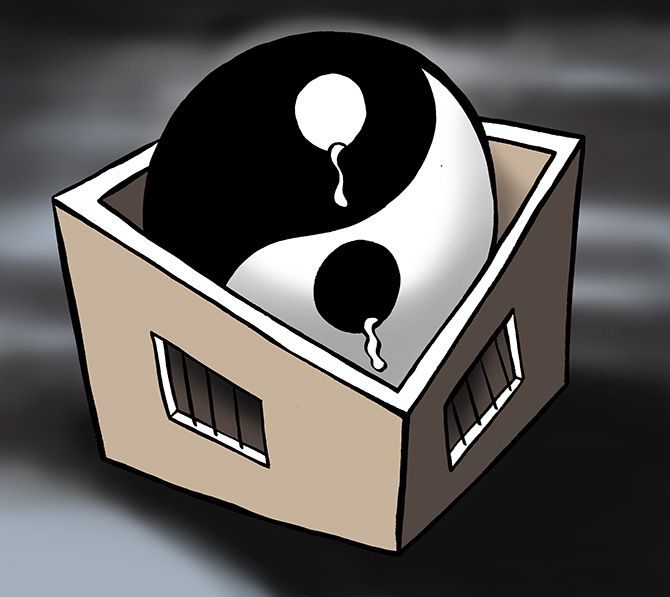'The key factor, to my mind, is happiness.'
'If either party, for whatever reason, is not in it, they should have the choice to walk away as painlessly as possible,' points out Vasu Primlani.
Illustration: Uttam Ghosh/Rediff.com

In the Supreme Court judgment, in a 3-2 majority win, triple talaq, or of the various forms of talaq, the one considered improper even in Islam, was struck down by the highest court in India.
Also interesting is the fact that there were five judges on the Bench for this hearing, one representing each religion, and of the five, two disagreed with the proposal that law could interfere in religious prescriptions in India.
There was also a noticeable gender divide. The petitioners were Shayara Bano, Aafreen Rehman, Gulshan Parveen, Ishrat Jahan, Atiya Sabri (all women), and the judges panel constituted Kurian Joseph, U U Lalit, R F Nariman, then Chief Justice J S Khehar, and Abdul Nazeer (all men).
There are three kinds of divorce in Islam, classified in terms of who seeks it.
When the man seeks it, it is called Talaq or Ila.
When it is sought by the woman, it is called Liyan, Faskh, Zihar, Khula and Talaq-e-tafweez.
When sought by mutual consent, the divorce sought is called Mubarrat.
Islam considers the triple talaq tradition came about after the founding of Islam, and as such, does not belong to Islamic law.
Perhaps instant coffee belongs to our homes, but instant talaq doesn't.
Most Muslims believe in the sanctity of marriage and encourage counselling, mediation, and a complete exhaustion of all resources and strategies before arriving at the sad conclusion of divorce. It is frowned upon, and disapproved of by Allah, as written in the Quran.
While I am glad that women who felt the talaq-e-biddat is too sudden to allow for reconciliation or response from women, and provides an inordinate amount of power to men in marriage, I am also saddened by this fight.
Shayara Bano has claimed in this petition that her husband ill-treated her, did not financially provide for her, made dowry demands, denied her food, medically poisoned her, and locked her in a room for several days. And Shayara Bano said her husband's act of triple talaq was unconstitutional.
It is with some amount of consternation that I ask: What would cause a woman to want to stay in an abusive marriage, by her own admission?
In her position, I would feel her husband's proclamation of triple talaq would sound like 'You free, Ms Scarlett!' And if it is social sanction or economic dependency, I would look to those sectors to question first,
It seems to me that marriage is an 'at will' relationship. To my mind, you ought to stay in it as long as it serves you in supporting, respecting and honouring you and your needs.
The key factor here, to my mind, is happiness.
If either party, for whatever reason, is not in it, they should have the choice to walk away as painlessly as possible.
Women are also allowed under the Shariat to dissolve a marriage, a procedure called khula. Instead of employing it in the face of obvious abuse, why is she not engaging it rather than wanting to be back with her husband?
Why would I want to be with a guy who thinks three words can callously destroy all we had without changing his ways, or trying hard enough?
And consider this. Talaq-e-biddat in essence allows an immediate dissolution of marriage.
The Hindu procedure of dissolution of marriage, by contrast, is painstakingly long. Even after aggrieved parties provide proof of abuse or torture at the hands of the partner in marriage, judges often decree a period of another six months before the judge would even consider divorce.
To me, it seems like the judge infantalises the married couple. Perhaps the judges do not consider that among all nations, Indians are famous for taking marriage very, very seriously.
And it takes perhaps hundreds of agonising hours of hand-wringing before a woman considers divorce, after having considered her commitment to marriage, her family name and honour, and the future of her children in addition to her own economic well-being, before she considers annulment.
And to mandatorily add to that a mandatory imposition of six months further extends the torture. Perhaps they do know what they are asking for by the time they approach the judge.
Parents would have intervened, friends would have tried to persuade, they themselves would have second-guessed themselves to a fault, and tried a variety of solutions and compromises, surely?
In this division between Hindu and Muslim, for couples on the orange side, stuck for an inordinately long time in the legal process of divorce under Indian courts, the grass may just look greener on the other side of the fence.











